Remote work began in early spring. We thought that "we will eventually return to working in the office," but even now, as summer comes to an end, it remains the same. There is a strong feeling that "Maybe we will continue to work remotely like this forever?" Work continues online, but have you ever wondered if this is really the best way to do it?
So, since spring, we have been thinking about how to communicate within Monosus, and we have started various initiatives. We held an online roundtable discussion with three people who have been trying various things. We made it possible for anyone in the company to participate, and at the most, about 26 people listened.
The main speakers were Onogi Yu, the facilitator of the general meeting, Sakamoto Yasuo, who started the "Weekly Sakamoto News," and Ito Yosuke, who is currently planning and developing the virtual office tool "MOVIO." The MCs were Kimi-chan, also known as Nakajima Nozomi, and myself, Sugimoto Kyoko.
This article provides a summary of the roundtable discussion.
Onogi-san, facilitator of the general meeting: "How can we create a new culture in our company in this situation?"
Nakajima: Today, I would like to ask about each of your efforts and also have a forum for the three of us to exchange information. I would like to start by asking about the specific background and content of what you are currently doing.
Onogi: Since we decided to change the format of the monthly meeting where all employees gather from a style where employees listen to Hayashi-san (Takahiro Hayashi, CEO of Monosus) to a more participatory style, I have been acting as a facilitator. The spread of the new coronavirus began just as we had created a template for the first half of the meeting, which is a general meeting and the second half is a meeting where everyone discusses.
Right now, I'm discussing with several members of the general meeting committee what we can do online, and we're trying different things. I'm particularly focusing on the latter half of the general meeting, thinking about how we can get everyone active and communicate with each other.
Nakajima: How do you decide on the topics for your recent discussions?
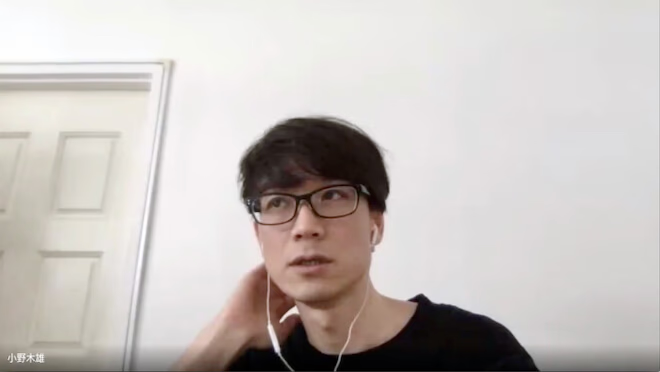
Designer Onogi-san, facilitator of the general meeting
Onogi: In the past few months, there have been many topics that have been centered around remote work and how we should think about it. Hayashi-san suggested "How should we use the office?", and "Dear, how is everyone doing?" was a discussion in which people wrote down their thoughts about remote work and then spoke about them. The other day, we split into groups and discussed the topic of "What if remote work continued for three years?"
After all, remote work has continued and everyone is scattered, so I think the topic of discussion is from the perspective of thinking about what can be positive. I don't think Corona will go away. Or, even if things calm down, there will be various realizations as a company in this situation, and I think there are things to lose and gain by remote work becoming mainstream.
It hasn't even been a year since the COVID-19 outbreak, so I think now is the time to create a new culture, so I think we'll be hearing a lot about remote work for a while.
Nakajima: I feel like it's better to talk about communication with everyone.
Onogi: Since the spread of COVID-19, I feel like the value of all-hands meetings has started to be reassessed. Because we can't meet in person, the value of being able to talk together is gradually emerging. I think we need to think about how to cultivate that value.
Nakajima: Onogi-san, what do you think about when you're having a group meeting?
Onogi: I heard that there were groups that were having trouble because they didn't have a facilitator when doing group work. Of course, we need to think about what to do, but I thought that assigning a facilitator and grouping people was a bit different.
That is, I think that in the future, I will need the ability to lead the discussion and change the atmosphere. If you think of it as a place where you can just say something, it's fine, so it's better not to design everything too much. I think that the fact that it's difficult to do without a facilitator is a good effect in itself. Of course, I'm worried and concerned!
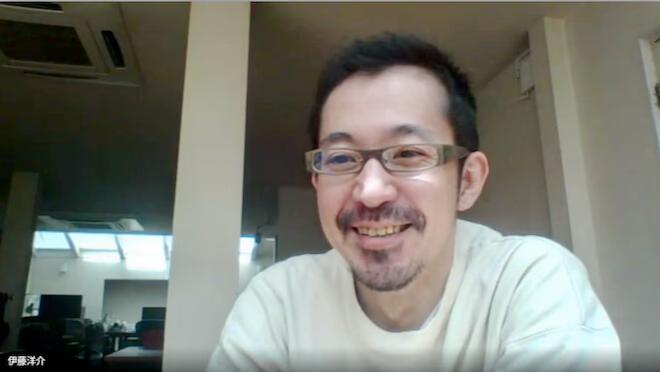
Ito-san
Ito: I find the things we talk about in group work extremely interesting. Trying to put things into words helps me organize my vague thoughts, and listening to someone speak helps me see the points where my synapses connect. It's a very appreciated place to accelerate my thinking.
Sakamoto: Right now, the only place we can all gather is the general meeting, so I wish it could be held about once a week. I'm really grateful for this opportunity.
Onogi: Since COVID-19 hit, I think there's been a hunger for interaction with everyone, a latent desire to connect with others across the company. This probably applies not just to general meetings, but to the entire company.
"I felt like the power of the Monosus group would be lost," said Sakamoto, who founded "SSN," also known as "Weekly Sakamoto News."
Nakajima: Mr. Sakamoto, you have started using ChatWork to publish something like an e-mail newsletter every Monday and Friday.
Sakamoto: I started to think "this is bad" around April. I work in sales, so my workload temporarily decreased, but I felt like we were losing our collective power as a company.
There is no problem working online when you look at it individually. However, when we all get together, we don't have the kind of "wisdom of Manjusri" that we get. It's like I'm working for a temporary agency called Monosus. I wondered, "What are you all doing?"
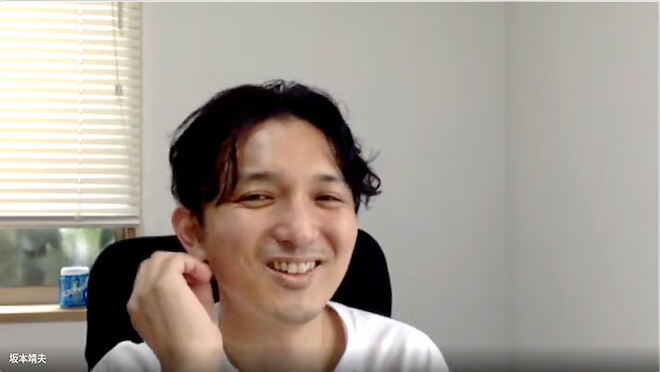
Sakamoto:
Even if we can't eat from the same pot, we can see the same things. When the "Monosasu Site" was updated every day, it was a place for everyone to see, but now it's difficult to do that. So I thought I'd try to send something out.
When you work remotely, there's no division into days or weeks. I thought I could create a tool that would make people think, "Oh, it's Friday," by distributing it at the same time every Friday. On Fridays, I distribute book introductions and other content that you can take your time to watch on the weekends, and on Mondays, I distribute seminar information and other motivating content little by little.
Sugimoto: Mr. Sakamoto said that he would send letters to his clients afterwards, but is it because he's accustomed to this kind of etiquette that he's able to broadcast so frequently?
Sakamoto: No, I'm not a regular at all. Everyone is surprised that "That Sakamoto is doing it every week!" and "It's still going on!" I don't know if they're praising me or dissing me though (laughs).
Onogi: He's someone who can liven up the atmosphere, but I don't think I had the image of him being the one to proactively share information. And it's still going on... Oh, I'm praising him! I'm praising him! (laughs)
Sakamoto: It's hard to write sentences, so I just make shallow comments like "That's awesome!" or "I want to read it!" on the stories people give me. Originally I only posted text, but some people said they wanted to see the archives, so now I'm making a summary on Google Sites like this (screen share ↓).
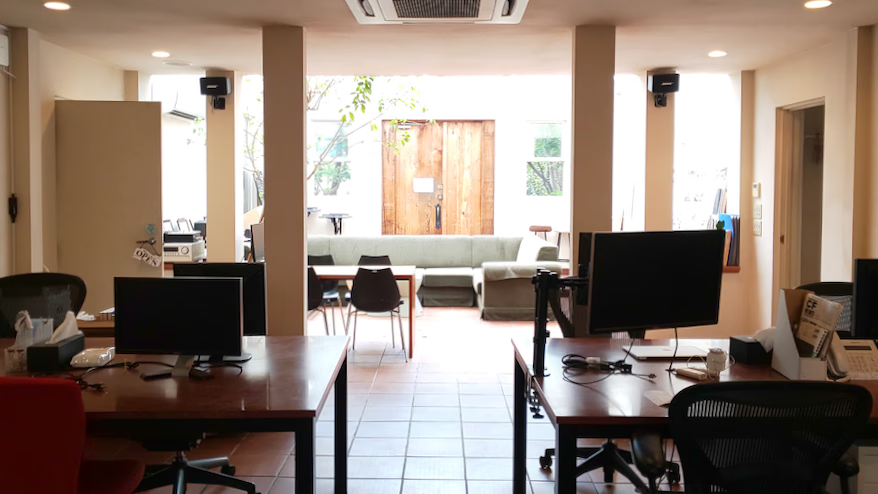
Weekly Sakamoto News, abbreviated as "SSN". Apparently they chose "food topics" as a common topic that everyone can easily watch.
Sugimoto: Wow! How long does it take to make this?
Sakamoto: I don't spend too much time on it, just pasting notes I made for myself and information on books I've heard other people recommend. I've also had Yamauchi Makoto start a project called "Everyone's Mixtape" which he's been free to update as a corner. I'd like to expand it further and make it into a small internal media where we can exchange opinions, like a sketchbook that everyone can use freely.

"MINNNA-NO MIXTAPE" made by Yamauchi
Ito: I'm not the type of person who presses the emotion icons on Chatwork or the like, but I press them quite often on Weekly Sakamoto News.
Sakamoto: It's stressful to think about it for everyone, so I just do it as a place for my own output. I try not to let the reactions motivate me. But I've been getting more and more opportunities to be told "You're really watching us" during group meetings, or when I say "Maybe we should stop," I get told "What? Are you quitting?"
Ito: I think it's great that the information I receive every week is fun and has just the right amount of warmth, and can be read without any mental barriers. I think it's the kind of project that induces a natural emotional fluctuation that makes it easy to support.
Virtual office tool "MOVIO" - Planner and developer Ito: "A tool that makes it easier to communicate remotely"
Nakajima: Why did you start making "MOVIO"?
Ito: At Monosus, many of our employees work mainly with data, so I thought that even if we were to work remotely, our regular work would continue as normal. I think it was good that we were able to make the transition smoothly compared to the general public.
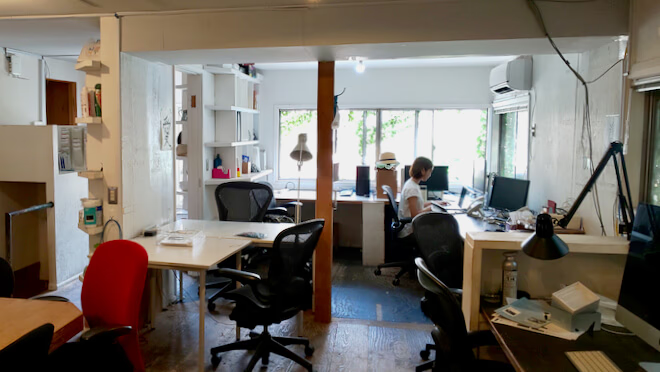
However, I thought, "Oh, is this how the company is?" Although there is communication between each unit and team, I felt that communication within my line of sight had decreased. When we had a meeting on the topic of "What should we do about COVID-19?", I suggested, "Why not create a virtual office that makes it easy to communicate remotely?"
When I consulted with CTO Kinoshita-san, he said, "Oh, maybe it could work," so we started working together. We also asked Sunami-kun to join us as an engineer. Here's what the alpha version turned out to be (screen shot below).
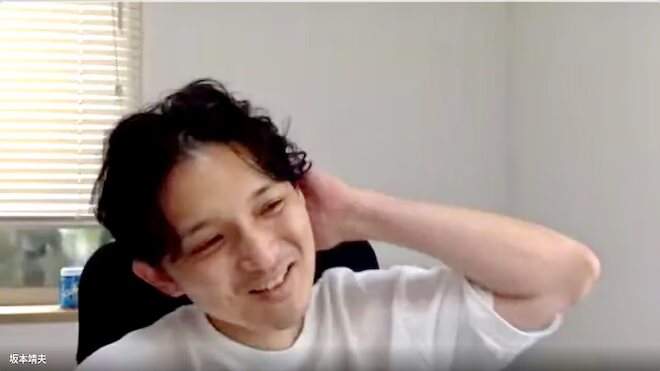
There are seats, and the name of the person sitting there appears. It's a tool that allows you to talk on video immediately by clicking. When I reported it to the company, Onogi-san, Takita-san, two designers, and engineer Matsunaga-kun joined us, and we are currently working on the development of the next version.
Nakajima: Having made it to the alpha version, how do you feel about the results?
Ito: There are more and more full-fledged tools with similar functions to "MOVIO" appearing in the world, so I can see that there is a need. Is it okay to use other tools? I have a dilemma, but my ulterior motive is that I would like to be able to create my own in-house product. I hope that this will become a sample and trigger the creation of a second or third in-house product.
Nakajima: Have you always wanted to create your own products?
Ito: I had a vague idea, but I didn't have a specific idea. When I imagined "MOVIO", I thought "Maybe we can make it?" and took a light step. Now, the members are gathering every week on their own time, and the next design is starting to move. It seems that Onogi-san has also come up with something he wants to make on his own.
Onogi: I wanted to create something like a simple bulletin board. An archive-like platform where you can easily post delivery reports for projects that can't be made public outside the company. I'd like to create a tool that lets you say, "I coded this," or "I drew this illustration," or "I worked hard on it, so take a look."
We use ChatWork and Slack in the company, and there is talk of "uploading production results with Google Slides," but as is the case in IT companies, information is scattered all over the place. I wanted to create an in-house tool that would consolidate all the information in one place, so that "if you look here, you can find out about anything that's going on in the company and you can easily post things."
What is a company? What is Monosus?
Sugimoto: Listening to the three of you talk, I found it interesting that you all operate from the perspective of "as a company," rather than just thinking about how your own work is going, or that your team or projects are doing well. What does your company, or Monosus, mean to you?
Onogi: I think there are various reasons why people stay at a company, such as "to acquire skills" or "to earn money." However, I also think that "who you want to work with" is important.
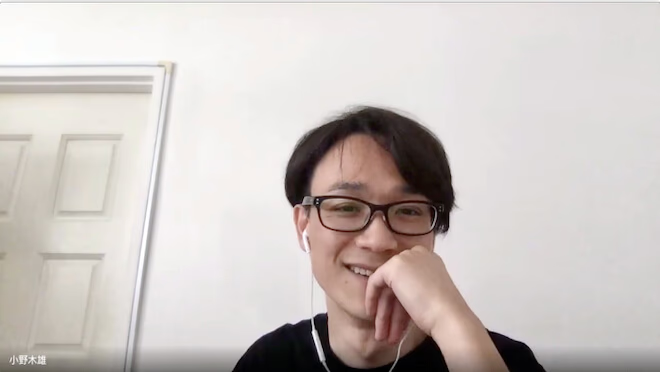
Onogi: A company is nothing more than a chain of one-to-one respect, and I think it's better to cherish small connections. Respect is born just by thinking, "This person thinks like this," or "Maybe I'll try to adopt that and do my best." Right now, COVID is getting in the way, but I hope that Monosus, a company, can be a base where respect can easily flow back and forth.

Sakamoto: It was only after the COVID-19 situation that I first started thinking about what a company is. Originally, Monosus had cherry blossom viewing parties and company trips, and was a company that over-communicated, so to be honest, I didn't have any desire to "liven up the company." Because it was just so natural.
However, after COVID-19, the horizontal connections suddenly disappeared and the power really dropped. If we only work remotely, I think that will probably happen not only to Monosas but to any company.
This was a topic of discussion at the last all-hands meeting, but I feel like remote work is possible thanks to the assets of communication we've had up until now. Because of that, I can understand "this person is thinking this" and "this is the nuance of what they're trying to say," but if we don't really do anything, our relationships will get weaker and weaker, and we'll start to feel like "strangers who are registered with the company," which would be dangerous, so I think that's why I started "Weekly Sakamoto News."
Nakajima: When relationships become weak, there's a sense that something is wrong.
Sakamoto: I'm in sales, so I'm sure I was the first to receive the "Yabai" message. It's times like these that we have to work hard at sales, but it's times like these that we really have to gather everyone's power like a "genkidama" (power ball) or else there's no point in being together. No matter how amazing a person is, I think there's only so much they can think of on their own.
We are now working at Monosus through fate, but if we were no longer physically together and each started doing our own thing, the meaning of "Monosus" would disappear.
Sugimoto: So you felt the power of the Monosus group without having to put it into words.
Sakamoto: That's right. There was a natural sense of solidarity and unity, and something new was born from casual conversation. I guess it felt like that was disappearing.
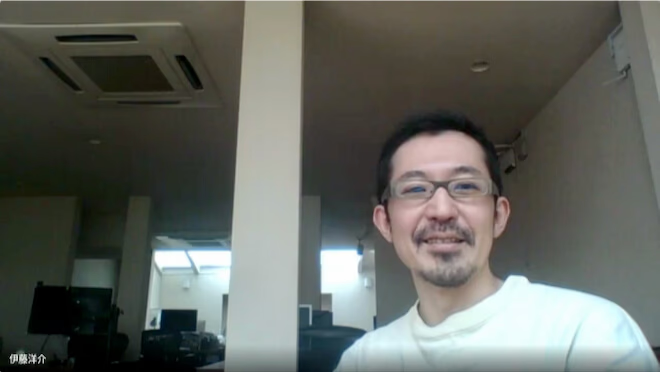
Ito: In the extreme, I think a company should be a place where people can work comfortably. I wonder. Isn't the current situation an obstacle to continuing to work comfortably? I guess the reason why so many people are worried is because there are so many people who want to work at this company. If we continue to try and error countermeasures, big and small, against the COVID-19 situation, we may be able to say that "Monosus is a group of people like this."
Once upon a time, Mr. Hayashi said, "A company is just a concept created for the sake of work," but I feel that concepts cannot win against the actual situation or environment. Perhaps we don't need to be obsessed with the word "company" itself. In this situation, whether it's a company or a group of freelancers, it would be good if the group called Monosus remained and we could all work together.
Sugimoto: Everyone was saying things like "COVID is getting in the way" and "COVID is an obstacle," but what struck me was that they were talking about it as a factor that hinders communication, rather than the impact it has on work and life. In response to that, I thought that Monosus as a group might be trying to create new forms of communication that are necessary.
Thank you for your time today!
